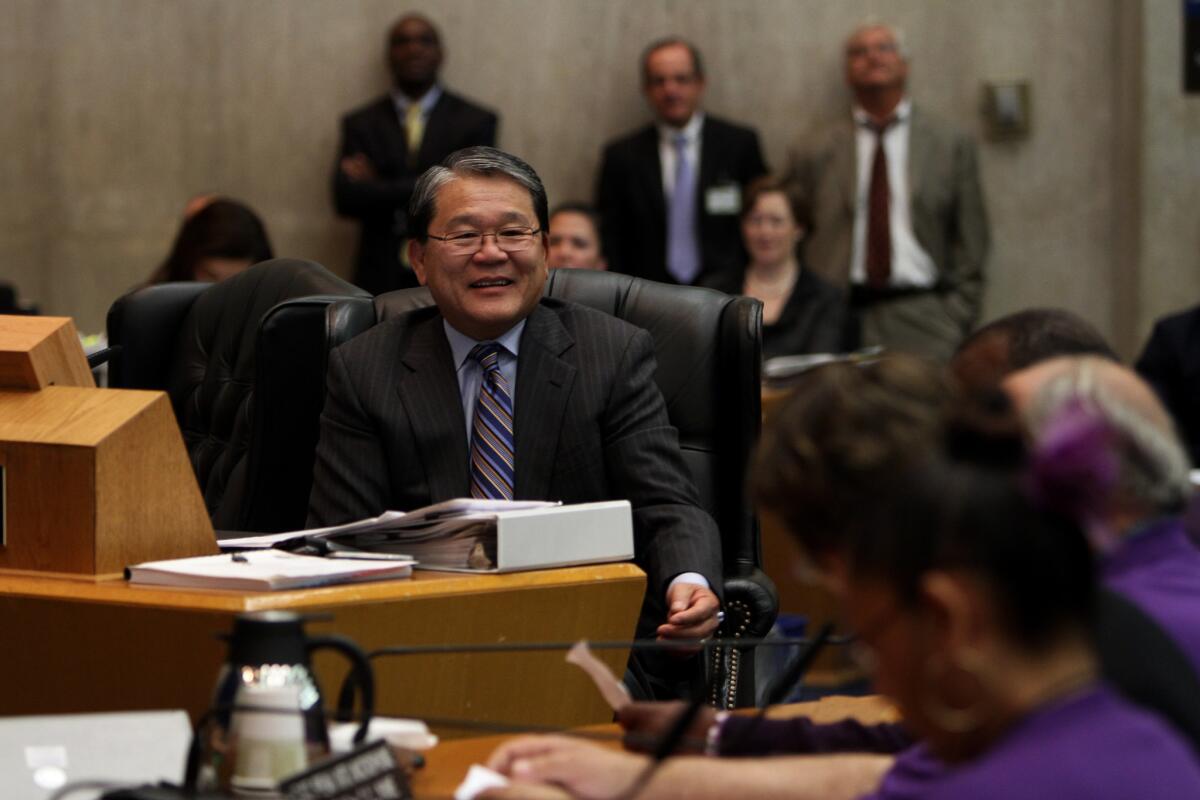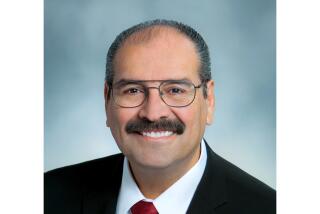William T Fujioka to step down after 7 years as L.A. County manager

Los Angeles County’s top manager announced plans to retire Thursday, signaling another wave in the sea change of leadership atop the nation’s largest county government.
William T Fujioka, 61, will step down in November as two new supervisors take office. In this month’s primary election, former U.S. Labor Secretary Hilda Solis won outright the seat being vacated by Supervisor Gloria Molina. Former state lawmaker Sheila Kuehl and Kennedy family scion Bobby Shriver are in a runoff for Zev Yaroslavsky’s seat.
They will be joined by a new sheriff and a new assessor in a change of political guard that has not been seen in county government for decades.
Fujioka said in an interview Thursday that he had agreed to serve five years when he was hired in 2007, but stayed longer to help guide the county through the Great Recession.
“It’s a good time to go,” he said. “It would not have been a good time to go several years ago.… When the day’s over, my biggest accomplishment is ensuring during the recession that we didn’t lay anybody off, we didn’t furlough anybody, and we continued to provide critical services.”
Fujioka grew up in East Los Angeles and carried a scrappy, street-smart attitude with him into the halls of power. He worked for the county for many years in various positions, including as a hospital administrator, then went to the city of Los Angeles, where he served as top administrator for eight years.
He retired briefly from that post before coming out of retirement to take the county position. There he earns a salary of $355,584 and oversees a $26-billion budget and workforce of more than 100,000.
The five-member Board of Supervisors hired Fujioka as part of a management reorganization that gave new powers to the top administrator. The structure was intended to allow the executive branch of county government to operate more independently, but the results have been mixed.
The supervisors scaled back Fujioka’s powers in 2011, taking the Los Angeles County Probation Department and Department of Children and Family Services out of his direct oversight.
Despite that move, probation chief Jerry Powers said Thursday that Fujioka had been a good partner to the department, helping him navigate the political waters of the board and advocating for money to carry out important reforms.
“It was probably a little awkward when the board took probation back over … but from the time I got here, Bill’s been nothing but accommodating,” Powers said.
Yaroslavsky, who is being termed out after two decades as a supervisor, said Fujioka had performed with distinction in shepherding the county through the recession. But he said the move to create a more independent chief administrator had been less successful.
“This is a very strong-willed board,” he said. “It’s become increasingly difficult for the CEO and department heads to do their jobs without a lot of second guessing.… I think Bill tried to accommodate as many people as possible and as many things as possible, and I understand his position, because with some of the attitudes we have here, if he hadn’t done that, he would have been a short-timer.”
Several other officials chimed in with praise for Fujioka. Molina credited his “prudent financial guidance and his strong leadership” for the county’s current good financial position. Los Angeles Mayor Eric Garcetti called Fujioka “a public servant in the truest sense of the word…. His wise counsel and sense of humor will be missed.”
The current board will have to decide whether to select a replacement for Fujioka before Yaroslavsky and Molina depart or wait until the new board members are seated Dec.1.
Yaroslavsky said there are pluses and minuses to both approaches, but that the board should “strike while the iron is hot” if they can reach a consensus on a candidate. Tony Bell, spokesman for Supervisor Michael D. Antonovich, echoed that, saying “the supervisor’s priority will be to ensure continuity within the CEO’s office — which would require the process as soon as possible.”
Fujioka declined to say whom he might recommend as a replacement, but added that he thought the job requires someone experienced in a “very large county.”
Miguel Santana, chief administrative officer for the city of Los Angeles, previously worked for the county for years and appears to be one likely candidate for the post. He could not be reached for comment Thursday.
The board had a difficult time filling the top post when Fujioka’s predecessor, David Janssen, retired. After a months-long search, they offered the job to then-Orange County chief executive Tom Mauk, who agreed to take it, but changed his mind one day later. Fujioka had previously declined to interview for the post, but agreed after Mauk backed out.
Janssen said Thursday that the job is difficult because of the size of the organization and the political dynamics: “You’ve got to be able to work collaboratively with the department heads, privately, confidentially with the supervisors, and you’ve got to have the respect of Sacramento and, to a lesser extent, D.C.,” he said.
He said the choice of a new chief executive “really ought to be a decision for a new board” because potential candidates would be reluctant to take a job offered by a board with two members set to leave.
Although the county’s finances have stabilized, the new top manager — and new board — will face serious challenges, including the continuing implementation of the Affordable Care Act, a planned $2-billion reconstruction of the downtown Men’s Central Jail and sweeping reforms in the county’s child welfare system.
Fujioka said that in his retirement, he plans to write a book about his experiences in government and give pro bono help to nonprofits, as well as possibly teaching and acting as a consultant to other municipal governments.
abby.sewell@latimes.com
Twitter: @sewella
Times staff writer David Zahniser contributed to this report.
More to Read
Start your day right
Sign up for Essential California for news, features and recommendations from the L.A. Times and beyond in your inbox six days a week.
You may occasionally receive promotional content from the Los Angeles Times.







